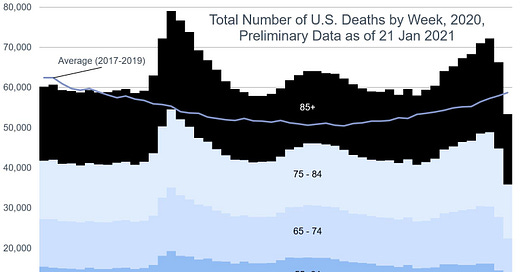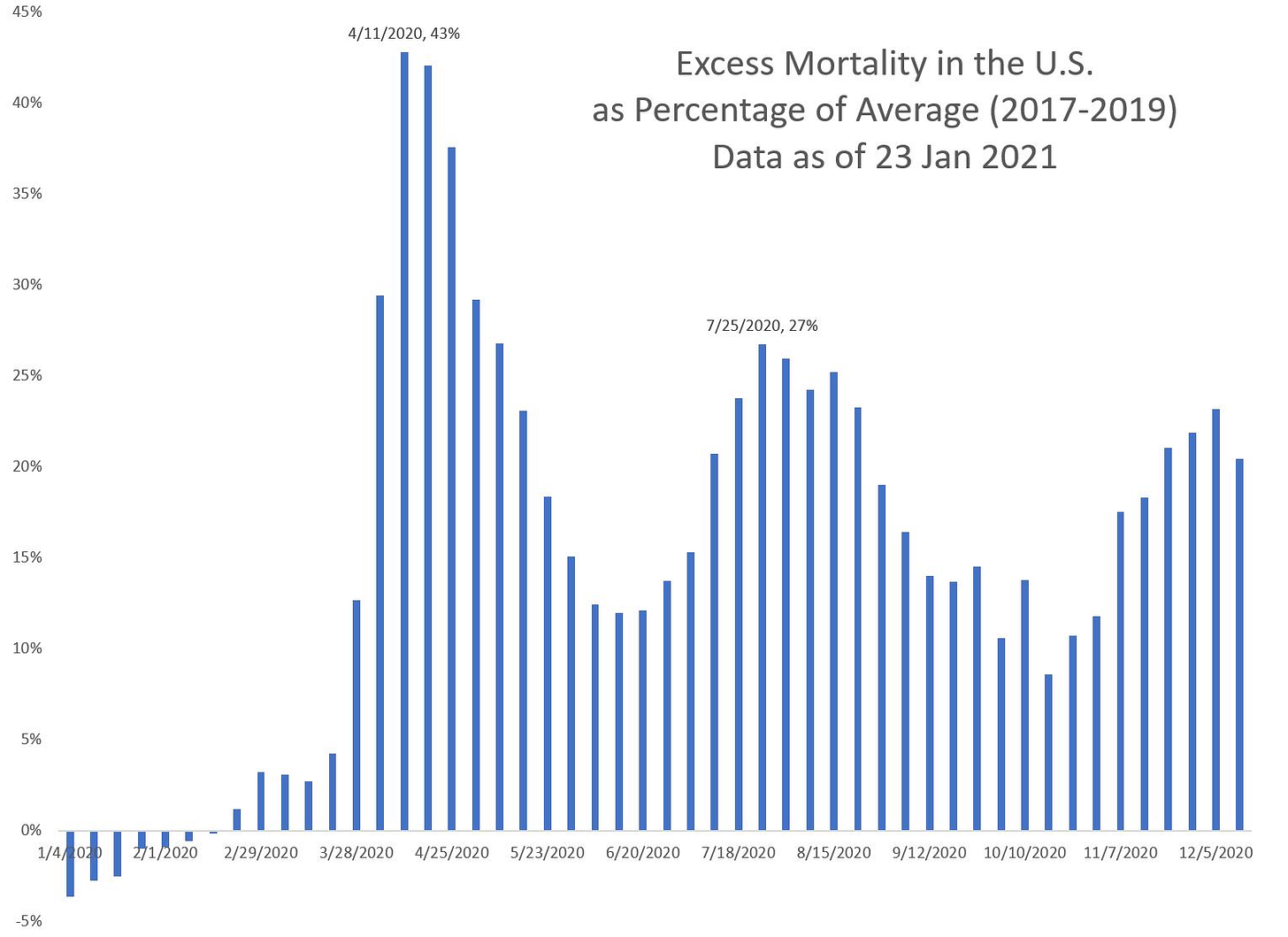Mortality with Meep: Total U.S. Excess Mortality in 2020, Overall and by Age
Starting with the most reliable data
Before I begin: the following is solely about excess mortality in 2020.
This is not about COVID-related deaths, or non-COVID excess mortality. I will address that in future posts.
Total mortality by week by age
Here is the first graph, showing total mortality by age, against a line showing the average weekly deaths for the same weeks, 2017-2019
Things to note:
The average mortality 2017-2019 was actually a little high in January, due to a bad flu year in January 2018
The last two weeks of December 2020 are unreliable re: data. There is a lag in death reporting, and you shouldn’t assume deaths peaked two weeks into December. The peak in total deaths may be occurring in January 2021… or even later, sadly.
If you want to know the total deaths I have for the week ending 1/4/2020 to the week ending 12/26/2020, it’s 3,254,484.
Obviously, this has a few days of 2019 in it, and is missing a few days of 2020. Also, those last two weeks of December are probably too low.
My projections of total 2020 deaths are looking pretty solid.
Excess mortality as a percentage
The next step is to show the percentage excess mortality by week.
I labeled a few points on this graph: the absolute peak of the mortality, which occurred in the week ending April 11, 2020 — at 40% higher number of deaths compared with 2017-2019 averages.
I also labeled the relative peak in the summer wave, which was the week ending July 25, 2020. This peak was a lot lower, obviously.
As for the winter wave, I’m not labeling that, as I’m not even sure the peak has yet been recorded.
Through December 12, 2020, the excess mortality is about 14%. That’s on the low side of my own projections, but partly due to missing December deaths and comparing to the 2017-2019 average versus just comparing against 2019.
Videos of Age Slices
For those who prefer their slices by age in video form:
U.S. Total Mortality 2020 Age 75+
U.S. Total Mortality 2020 Age 45-74
U.S. Total Mortality 2020 Under age 45
Reminder: why total or excess mortality to begin with
I have had arguments re: COVID mortality all this year (and I just got a question re: the “they were going to die in under a year anyway” which is not the case for most COVID deaths. But that’s for a future post.)
I do agree it’s reasonable to question aspects of the mortality data out there, including cause of death data. I have started wondering about death-due-to-Alzheimer’s, in that I have no idea how Alzheimer’s kills you, unlike with heart disease or cancer. One of the issues is that you can’t put “old age” on a death certificate as a cause.
It’s not only cause of death that’s an issue: there is who died. I don’t want to delve into the wrong person being identified in a death certificate (and definitely not wrong people marked as dead in the Social Security system), but there are issues of age, race/ethnicity, and even sex. There’s when the person died, which may be iffy if they died at home and they live alone… and the body is found some weeks later.
The good news is that some of these items are much easier to get right than others, and so when it comes to items such as age, sex, and when they died, we usually have good data for those the vast majority of the time.
But the main point is this: we generally don’t get the count of all the dead people far wrong. Yes, a few people die whose bodies are not found until a long time later. There are people who disappear (swept off a boat, go hiking the Appalachian (literally, not the euphemism) and eaten by a bear, murderer hides the body), but dead bodies are hard to hide, except in the ocean. If the counts of dead people are off, it’s not by a huge percentage. And we definitely don’t have a bunch of fake death certificates floating around. It is very difficult to fake a death, though it does still happen.
So I start with our most reliable slice of data, which is total death count. I also did a split out by age, and I will be doing a deeper dive into the various age groups, especially the younger adults. As you can see from my videos, there was essentially no excess mortality for those under age 25, but the mortality for those age 25 – 44 is very concerning, and mostly not directly caused by COVID.
Data sources
Data originally taken from the CDC, list of the CDC files here, downloaded on 23 Jan 2021.
Underlying spreadsheet at my Dropbox, free to download.





